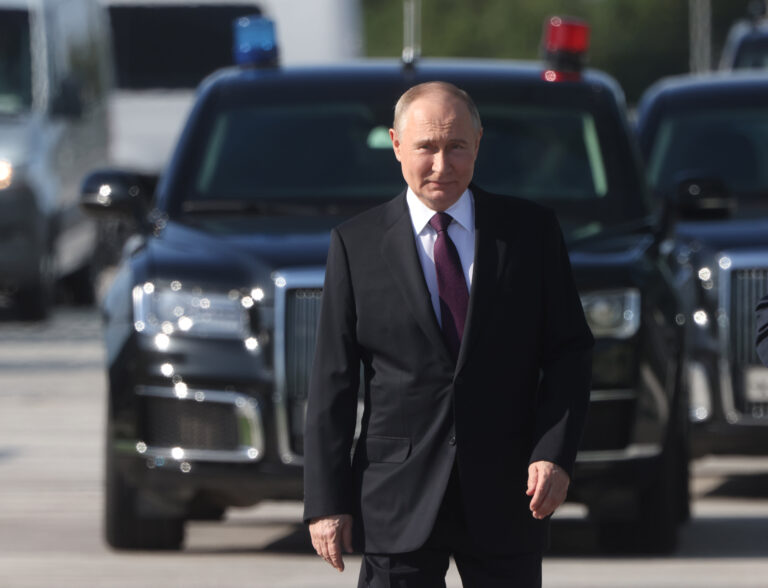Russian President Vladimir Putin during a visit to the Lakhta Center in St. Petersburg, Russia, June 5, 2024. President Vladimir Putin visited Gazprom’s newly built high-rise Lakhta Center ahead of his meeting at the St. Petersburg International Economic Forum SPIEF 2024.
Contributor | Getty Images News | Getty Images
Now Russia is using SPIEF to build new ties with countries it sees as more willing to do business with a country that has invaded its neighbors – namely many in Asia, Latin America and Africa, as well as Russian oil and gas customers in Eastern Europe, Slovakia and Hungary – countries that are willing to turn a blind eye to the war for the sake of their own economic interests.
SPIEF is the latest effort in the Kremlin’s campaign to show that everything is still normal, Max Hess, a fellow at the Foreign Policy Research Institute and author of “Economic War: Ukraine, Russia and the West’s Global Conflict,” told CNBC on Thursday.
“They make a big fuss about international attendance and domestic publicity, with the exception of regular figures like the Hungarian foreign minister. [Peter Szijjarto]”No new big names will be attending and no new major investments or deals will be agreed at the forum, at least not with major foreign countries,” he said.
A view of the stand of Russian private bank Alfa-Bank at the 27th St. Petersburg International Economic Forum on June 5, 2024 in St. Petersburg, Russia.
Anadolu | Anadolu | Getty Images
SPIEF has been blacklisted by most Western companies and politicians since February 24, 2022, when Russian troops invaded Ukraine. But Russia is keen to demonstrate that it is open to business from other countries, and indeed its need and desire for economic collaboration with non-Western countries has been accompanied by growing anti-Western sentiment and rhetoric in recent years.
Moscow claims to want to establish a “multipolar” world order to counter Western hegemony, and promotes trade partnerships that exclude the West as a means to that end. In light of this, the theme of SPIEF 2024 is “Foundations for a Multipolar World – Shaping New Growth Areas.”
This year’s program includes sessions on Russia’s expanding Arctic development, the expansion of the BRICS economic bloc, Russia’s automotive industry, as well as “family values” – another pillar of Russian President Vladimir Putin’s fifth term in office – and Russia’s relations with the West.
The session entitled “The Evil Empire: Has the West Succeeded in Demonising Russia?” asks delegates to reflect on whether the so-called “smear campaign” by Western countries against Russia has been successful.
Yuri Ushakov, a foreign policy adviser to the Russian president, told reporters ahead of the forum that representatives from 136 countries were reported to be attending the forum, which runs from June 5-8.
Putin is expected to address delegates on Friday to tout Russia’s economic resilience, investment opportunities and growth despite international sanctions. But it is unclear to what extent the speech will focus on the Ukraine war or “special military operations.” Russia is likely to want to avoid conflict as it seeks to attract investment.
Foreign guests on the first day of the St. Petersburg International Economic Forum 2024.
Sopa Images | LightRocket | Getty Images
To the irritation of the West, Russia has managed to adapt its economy to a new reality of sanctions and trade restrictions on some of its key industries, including the oil and gas sector.
The International Monetary Fund predicted in April that Russia’s economy will grow faster than all developed countries this year.
In its latest World Economic Outlook, the IMF said it expects Russia to grow by 3.2 percent in 2024, outperforming expected growth rates in the United States (2.7 percent), Britain (0.5 percent), Germany (0.2 percent) and France (0.7 percent).
Russia says Western sanctions on its key industries have made it more self-sufficient and that private consumption and domestic investment remain strong, while continued exports of oil and commodities to countries like India and China, as well as suspected sanctions evasion and high oil prices, have helped Russia maintain solid oil export revenues.
Russian President Vladimir Putin speaks at the BRICS Business Summit via a recorded video in Johannesburg, South Africa, on August 22, 2023.
Per Anders Pettersson | Getty Images News | Getty Images
Analysts are closely watching announcements regarding the BRICS organization, an economic bloc of Brazil, Russia, India, China and South Africa that has added new members since January, including Ethiopia, Iran and Egypt. Turkey has signaled possible membership in the bloc. Opportunities for economic cooperation among the BRICS countries is a major theme at this year’s SPIEF.
Kremlin spokesman Dmitry Peskov on Tuesday welcomed Turkey’s interest in joining BRICS and said the issue would be on the agenda at the next BRICS summit.
Analysts like Hess believe any talk of expanding the BRICS grouping is political posturing.
“Will Putin actually get anything meaningful out of what he wants? No, maybe a kabuki theater.” [political posturing] “This will continue and Turkey will have further discussions about joining BRICS, but as the organization’s expansion announcement in January made clear, this is completely meaningless,” Hess said.

